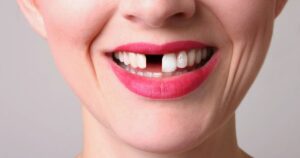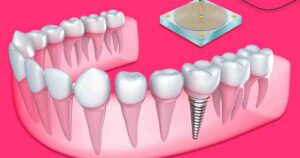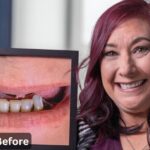Dentures are removable artificial teeth. People use them to replace missing natural teeth. Dentures can be full, replacing all teeth, or partial, replacing just a few. They help with chewing and give a confident smile.
Are your dentures causing discomfort and slipping? Fret not! You can improve the fit of your dentures right at home, no need for costly dental visits. Discover the secrets to comfortable and secure dentures in our guide on How To Make Dentures Fit Better At Home. Say goodbye to irritation and hello to a confident, pain-free smile!
Get ready to enjoy a snug fit for your dentures! Follow our easy tips in the guide on How To Make Dentures Fit Better At Home.Say goodbye to discomfort and hello to a confident smile today. Take action now for a more comfortable denture experience!
Understanding Denture Fit
Before we delve into the ways to improve denture fit at home, it’s essential to understand why dentures might not fit well. Dentures are designed to fit the contours of your mouth, creating a suction seal that keeps them in place. However, changes in your mouth’s shape and the wear and tear on dentures can cause them to lose their snug fit. Common factors affecting denture fit include:
| Home Remedies for Better Denture Fit | Description |
| Maintain Good Oral Health | Regularly brush gums, tongue, remaining natural teeth, and clean dentures for a better foundation. |
| Use Denture Adhesives | Creams, powders, and strips can create a better seal between dentures and gums. |
| Adjusting the Dentures | Try simple home adjustments with a denture adjustment kit, but use caution and consult a dentist. |
| Reline Your Dentures | Add soft or hard material inside dentures to improve fit; consult a dentist for professional reline. |
| Salt Water Rinse | Rinse mouth with warm salt water to reduce inflammation and improve the seal. |
| Denture Cushions | Soft pads for added comfort and fit, reducing friction and irritation. |
| Adhesive Strips or Powders | Provide extra stability and help prevent dentures from slipping. |
| DIY Denture Liners | Temporary relief options made from materials like beeswax or soft denture lining material. |
| Avoid Sticky or Hard Foods | Stick to a soft diet to avoid extra pressure on dentures. |
| Stay Hydrated | Drinking enough water throughout the day helps maintain a good grip. |
Bone Resorption
When natural teeth are lost, the underlying jawbone can begin to shrink or resorb over time. This can alter the shape of your mouth and cause dentures to become loose.
Denture Wear and Tear
Dentures, like any other appliance, undergo wear and tear. Over time, the materials may degrade, affecting their fit and function.
Weight Changes
Significant weight gain or loss can impact the shape and size of your mouth, leading to changes in denture fit.
Aging
As you age, your gums and bone structure may change, which can affect denture fit.
Poor Oral Care
Neglecting oral hygiene can lead to gum problems and bone loss, further contributing to ill-fitting dentures.
Now that we understand why dentures may not fit as well as they used to, let’s explore some effective ways to improve their fit in the comfort of your home.
Home Remedies for Better Denture Fit
Improving denture fit at home is possible. You can use denture adhesives like creams, powders, or strips. Make small adjustments to your dentures with a kit, including adjusting partial denture clasps, but be cautious not to overdo it. A dentist can professionally reline your dentures to improve the fit.
Maintain Good Oral Health
The foundation of a well-fitting denture starts with maintaining good oral hygiene. Regularly brushing your gums, tongue, and any remaining natural teeth, as well as cleaning your dentures properly, can prevent gum inflammation and bone loss. A healthy mouth will provide a better foundation for your dentures.
Use Denture Adhesives
Denture adhesives are available in various forms, such as creams, powders, and strips. These products can help create a better seal between your dentures and your gums. Be sure to follow the manufacturer’s instructions for the best results.
Adjusting the Dentures
If your dentures have become loose over time, they may need some adjustments. You can try a simple home adjustment by using a denture adjustment kit, which is available at most drugstores. However, it’s essential to exercise caution and not overdo it. If you’re unsure, it’s best to consult a dentist for professional adjustments.
Reline Your Dentures
Denture relining is a process where a soft or hard material is added to the inside of your dentures to improve their fit. You can purchase denture reline kits for home use, but it’s advisable to consult a dentist for this procedure. A professional can ensure the reline is done accurately, providing a better fit and more comfort.
Salt Water Rinse
A simple and natural way to temporarily improve denture fit is to rinse your mouth with warm salt water. This can help reduce inflammation and irritation in your gums, potentially enhancing the seal between your dentures and your mouth.
Consider Denture Cushions
Denture cushions are soft pads that you can place inside your dentures for added comfort and fit. They can help reduce friction and irritation, making your dentures more comfortable to wear.
Adhesive Strips or Powders
In addition to traditional denture adhesives, adhesive strips and powders are available as alternatives. These products can provide extra stability and help prevent dentures from slipping.
DIY Denture Liners
Some people have found success with DIY denture liners made from materials like beeswax or soft denture lining material. While these solutions may offer temporary relief, they are not a substitute for professional care.
Avoid Sticky or Hard Foods
Consuming sticky or hard foods can put extra pressure on your dentures, causing them to become loose. Stick to a soft diet that is gentler on your dentures.
Stay Hydrated
Dry mouth can make it difficult for dentures to maintain a good grip. Make sure to stay hydrated by drinking enough water throughout the day.
Consult Your Dentist
While these home remedies can be effective in improving denture fit, it’s crucial to consult your dentist regularly. Dentists have the expertise and tools to assess your dentures’ condition and make professional adjustments when necessary. If your dentures no longer fit well and home remedies are not providing relief, it may be time to consider a new set of dentures.
When to Consider New Dentures

While many home remedies can help improve the fit of your dentures, there comes a point when replacement is the best option. Here are some signs that it may be time for a new set of dentures:
Frequent Breakage
If your dentures are continually breaking or cracking, it’s a sign that they may be past their prime. Frequent repairs can be costly and frustrating.
Severe Wear and Tear
Over time, the materials in dentures can deteriorate, leading to an ill fit and a less natural appearance. If your dentures have seen better days, it might be time for an upgrade.
Significant Changes in Your Mouth
If you’ve experienced significant changes in your mouth due to factors like weight loss, aging, or disease, your current dentures may no longer fit properly.
Persistent Discomfort
Unresolved discomfort or sore spots, despite adjustments and relining, could be an indication that your dentures are no longer suitable for your needs.
Gum or Bone Resorption
Severe bone resorption can make it nearly impossible for dentures to stay in place, as there may not be enough bone to support them. In such cases, implant-supported dentures or a different prosthetic solution may be recommended.
Excessive Movement
If your dentures move significantly while eating or speaking, it can affect your confidence and quality of life. New dentures may provide a more secure fit.
How Can I Tighten My Dentures At Home?
If you want to tighten your dentures at home, here are some simple steps to follow. First, you can use a denture adhesive. Apply a small amount to your dentures for a better fit. Second, you can try a denture reline kit available at drugstores, but be cautious not to overdo it. If these steps don’t work, it’s best to see a dentist for professional adjustments.
A dentist can provide the best solutions for improving your denture fit and comfort. Tightening your dentures at home is a temporary fix, and if they no longer fit well, it may be time to consider getting new dentures.
How To Smooth Dentures At Home?
To smooth dentures at home, use a fine emery board to gently file any rough spots, but be cautious not to overdo it. Rinse the dentures thoroughly after smoothing, and if you encounter significant issues, consult your dentist for professional help to ensure comfort and an optimal fit.
FAQ’s
Are denture adhesives effective in improving denture fit?
Yes, denture adhesives can enhance the fit by creating a better seal between your dentures and gums. Follow the manufacturer’s instructions for the best results.
How can I temporarily relieve discomfort from ill-fitting dentures?
You can use saltwater rinses or denture cushions for temporary relief from discomfort. These methods can help reduce irritation and improve comfort.
What should I do if my dentures keep slipping while eating or speaking?
Consider using denture adhesive strips or powders to enhance stability. Also, maintaining good oral hygiene and consulting your dentist for professional advice can help.
Conclusion
Well-fitting dentures are crucial for your comfort and confidence. Make Dentures Fit Better At Home There are several home remedies and adjustments you can make to improve the fit of your dentures, but it’s essential to know when it’s time for professional help or replacement.
Regular dental check-ups are crucial to monitor the condition of your dentures and ensure they continue to meet your needs. By combining good oral hygiene practices with the right denture care techniques, you can enjoy a comfortable and secure fit, enabling you to eat, speak, and smile with confidence.











